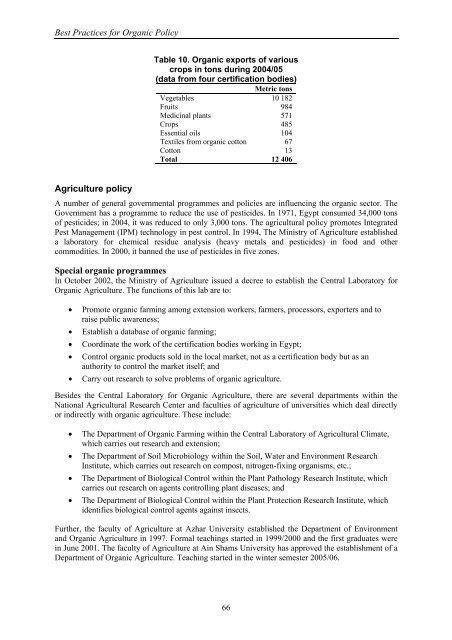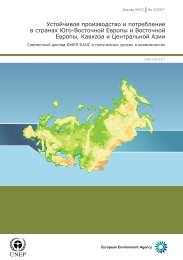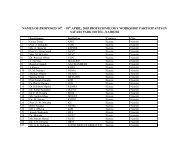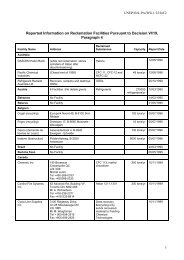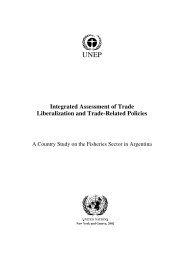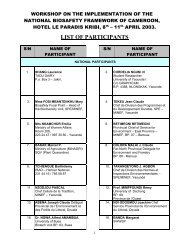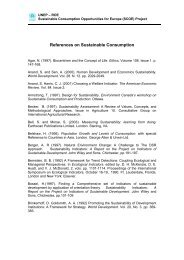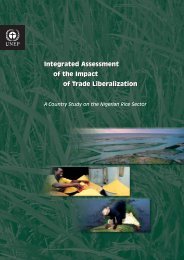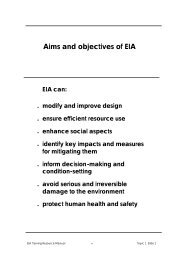Best Practices for Organic Policy - What developing country - UNEP
Best Practices for Organic Policy - What developing country - UNEP
Best Practices for Organic Policy - What developing country - UNEP
Create successful ePaper yourself
Turn your PDF publications into a flip-book with our unique Google optimized e-Paper software.
<strong>Best</strong> <strong>Practices</strong> <strong>for</strong> <strong>Organic</strong> <strong>Policy</strong><br />
Table 10. <strong>Organic</strong> exports of various<br />
crops in tons during 2004/05<br />
(data from four certification bodies)<br />
Metric tons<br />
Vegetables 10 182<br />
Fruits 984<br />
Medicinal plants 571<br />
Crops 485<br />
Essential oils 104<br />
Textiles from organic cotton 67<br />
Cotton 13<br />
Total 12 406<br />
Agriculture policy<br />
A number of general governmental programmes and policies are influencing the organic sector. The<br />
Government has a programme to reduce the use of pesticides. In 1971, Egypt consumed 34,000 tons<br />
of pesticides; in 2004, it was reduced to only 3,000 tons. The agricultural policy promotes Integrated<br />
Pest Management (IPM) technology in pest control. In 1994, The Ministry of Agriculture established<br />
a laboratory <strong>for</strong> chemical residue analysis (heavy metals and pesticides) in food and other<br />
commodities. In 2000, it banned the use of pesticides in five zones.<br />
Special organic programmes<br />
In October 2002, the Ministry of Agriculture issued a decree to establish the Central Laboratory <strong>for</strong><br />
<strong>Organic</strong> Agriculture. The functions of this lab are to:<br />
• Promote organic farming among extension workers, farmers, processors, exporters and to<br />
raise public awareness;<br />
• Establish a database of organic farming;<br />
• Coordinate the work of the certification bodies working in Egypt;<br />
• Control organic products sold in the local market, not as a certification body but as an<br />
authority to control the market itself; and<br />
• Carry out research to solve problems of organic agriculture.<br />
Besides the Central Laboratory <strong>for</strong> <strong>Organic</strong> Agriculture, there are several departments within the<br />
National Agricultural Research Center and faculties of agriculture of universities which deal directly<br />
or indirectly with organic agriculture. These include:<br />
• The Department of <strong>Organic</strong> Farming within the Central Laboratory of Agricultural Climate,<br />
which carries out research and extension;<br />
• The Department of Soil Microbiology within the Soil, Water and Environment Research<br />
Institute, which carries out research on compost, nitrogen-fixing organisms, etc.;<br />
• The Department of Biological Control within the Plant Pathology Research Institute, which<br />
carries out research on agents controlling plant diseases; and<br />
• The Department of Biological Control within the Plant Protection Research Institute, which<br />
identifies biological control agents against insects.<br />
Further, the faculty of Agriculture at Azhar University established the Department of Environment<br />
and <strong>Organic</strong> Agriculture in 1997. Formal teachings started in 1999/2000 and the first graduates were<br />
in June 2001. The faculty of Agriculture at Ain Shams University has approved the establishment of a<br />
Department of <strong>Organic</strong> Agriculture. Teaching started in the winter semester 2005/06.<br />
66


